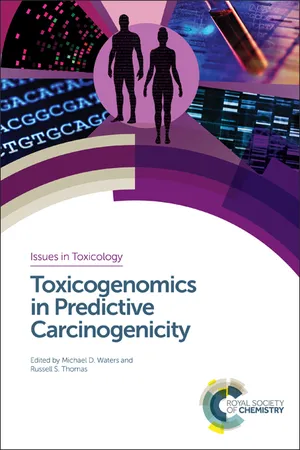
- 524 pages
- English
- PDF
- Available on iOS & Android
Toxicogenomics in Predictive Carcinogenicity
About this book
Research over the past decade has demonstrated that TGx methods of various types can be used to discriminate modes of mutagenesis as a function of dose. TGx can quickly inform safety evaluation regarding potential mechanisms of conventional outcomes and can provide essential dose-response information. This can then be used to ascertain the sequence of key events in a putative mode of action as may apply in quantitative cancer risk assessment. With the increasing complexity of research in mode of action investigations it is important to gain a better understand of approaches to data integration and health risk assessment. Furthermore, it is essential to consider how novel test systems and newer methods and approaches may be used in future to gain a better understanding of mechanisms.
Toxicogenomics in Predictive Carcinogenicity describes toxicogenomics methods in predictive carcinogenicity testing, mode of action and safety evaluation, and cancer risk assessment. It illustrates these methods using case studies that have yielded significant new information on compounds and classes of compounds that have proven difficult to evaluate using conventional methods alone. This book additionally covers current and potential toxicogenomic research using stem cells as well as new bioinformatics methods for drug discovery and environmental toxicology.
This publication is an indispensable tool for postgraduates, academics and industrialists working in biochemistry, genomics, carcinogenesis, pathology, pharmaceuticals, food technology, bioinformatics, risk assessment and environmental toxicology.
Tools to learn more effectively

Saving Books

Keyword Search

Annotating Text

Listen to it instead
Information
Table of contents
- Cover
- Contents
- Preface
- Chapter 1 Introduction to Predictive Toxicogenomics for Carcinogenicity
- Chapter 2 Genomic Biomarkers in Cell-based Drug Screening
- Chapter 3 Toxicogenomics In vitro: Gene Expression Signatures for Differentiating Genotoxic Mechanisms
- Chapter 4 In vivo Signatures of Genotoxic and Non-genotoxic Chemicals
- Chapter 5 Transcriptomic Dose-Response Analysis for Mode of Action and Risk Assessment
- Chapter 6 Using Transcriptomics to Evaluate Thresholds in Genotoxicity Dose-Response
- Chapter 7 Dissecting Modes of Action of Non-genotoxic Carcinogens
- Chapter 8 Human Embryonic Stem Cells as Biological Models to Examine the Impact of Xenobiotics on the Genome and Epigenome
- Chapter 9 Novel Data Streams in the Assessment of Mutagenicity and Carcinogenicity: Implications for Cancer Hazard Assessment
- Chapter 10 Conazoles and Cancer: A Review
- Chapter 11 Application of Transcriptomics in Exposed Human Populations: Benzene as an Example
- Chapter 12 Toxicogenomics Case Study: Furan
- Chapter 13 The Parallelogram Approach to Assess Human Relevance of Toxicogenomics-derived Toxicity Pathways in Human Health Risk Assessment
- Chapter 14 Bioinformatics of Genomics in the Assessment of Cancer
- Subject Index
Frequently asked questions
- Essential is ideal for learners and professionals who enjoy exploring a wide range of subjects. Access the Essential Library with 800,000+ trusted titles and best-sellers across business, personal growth, and the humanities. Includes unlimited reading time and Standard Read Aloud voice.
- Complete: Perfect for advanced learners and researchers needing full, unrestricted access. Unlock 1.4M+ books across hundreds of subjects, including academic and specialized titles. The Complete Plan also includes advanced features like Premium Read Aloud and Research Assistant.
Please note we cannot support devices running on iOS 13 and Android 7 or earlier. Learn more about using the app